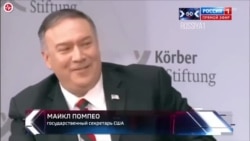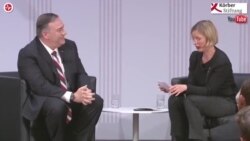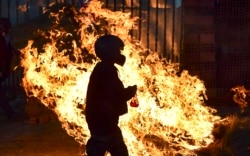On the November 17, Russian TV’s “60 Minutes” program devoted a segment to the political turmoil in Bolivia. In introducing the news, the program’s hosts, Olga Skabeyeva and her husband Yevgeny Popov, alleged that the U.S. had ousted Bolivia’s Evo Morales and that he resided in the Bolivian city of Cochabamba after the Latin American countries denied him asylum.
For good measure, they also claimed that U.S. Secretary of State Mike Pompeo admitted the U.S. “tore” Ukraine away from Russia.
“60 Minutes” is an award-winning daily prime-time political talk show on the Russian state TV channel Rossiya 1. Rossiya 1 claims 98 percent of Russians are viewers, along with more than 50 million people in the former Soviet states.
The segment on Bolivia came 47 minutes into the program. Up until that point, the program had focused exclusively on events in Ukraine – which, as Polygraph.info has reported, is a regular target of “60 Minutes” disinformation.
In their report on Bolivia, Skabeyeva and Popov made several false claims.
Skabeyeva began by stating that several South American countries denied asylum to Morales and that he was living in the Bolivian city of Cochabamba.
Yet while this edition of “60 Minutes” was broadcast on November 17, Mexico had granted Morales political asylum on November 11, as Russian TV itself had reported that day. Morales arrived in Mexico on November 13.
Popov said: “We know perfectly well those who arranged all this, who sought the resignation of Morales - the United States. Well, they have admitted something else. They have admitted that for them Ukraine is just a project on which the United States has worked for many years. That is, in fact, the United States deliberately tore off Ukraine from Russia and Pompeo said that.”
Viewers were then shown a video clip from an unattributed interview with U.S. Secretary of State Mike Pompeo in Russian, with a Russian-language voiceover ostensibly translating Pompeo’s remarks.
Here is an English translation of what “60 Minutes” presented as Pompeo’s remarks in Russian:
Q. “How much is the U.S. concerned about stability in Ukraine?”
P. “A lot…”
Q. “A lot?”
P. “Yes, a lot. It’s a project which we have been working on. Trump two or three times provided military equipment to Ukraine, so it could protect itself from Russian aggression in the Donbas. We are proud of it. We believe it matters for the freedom of Europe [and] the world, and for Ukraine’s sovereignty.”
Polygraph.info identified the video used by “60 Minutes” as a segment from a Q&A that followed a speech Pompeo gave in Berlin to the Körber-Stiftung Foundation, a German technology shareholder group. The speech was on November 8, during his visit to Germany for the 30th anniversary of the fall of the Berlin Wall.
Video of the speech and Q&A is on the Körber-Stiftung Foundation’s YouTube channel.
Pompeo’s original comments on Ukraine differ from the version shown by “60 Minutes.” Here is what Pompeo actually said:
Q. “How committed is the U.S. to peace and stability in Ukraine? Without any preconditions?”
P. “Very.”
Q. “Very?”
P. “Very, very committed, yes. It’s a project we have been working on … I remember I was at the Munich Security Conference when I was a member of Congress in Kansas. And I remember pushing – the topic at this time was whether defensive weapons systems would be provided to the Ukrainians, it must have been 2015 or 16 … And I remember Germany deciding it was a bad idea and
America deciding it was a bad idea, President Obama deciding it wasn’t something he wanted to do. In fact, President Trump has now not once, not twice but three times come to provide the tools so that the Ukrainian people can protect themselves from Russian aggression in the Donbas. We are proud of that. We think it makes sense. We think it makes sense for freedom, we think it makes sense for Europe, we think it makes sense for the world and Ukrainian sovereignty. We are very clear about our position on the invasion of Crimea that happened in the previous administration, and how it is we are going to work to develop a prosperous Ukraine that is less corrupt and capable of moving itself towards the West.”
Neither in Russian translation of Pompeo’s remarks provided by “60 Minutes” nor in the original video of his comments did Pompeo “admit” that the U.S. “deliberately tore off Ukraine from Russia.”
U.S. relations with Evo Morales were complicated with occasional espionage scandals, expulsions of diplomats, and accusations of U.S. interference in Bolivia’s domestic politics.
Morales’ resignation, however, came during mass protests in the country after the Organization of American States (OAS) reported “extensive irregularities” in the election for his fourth term.
Morales had invited the OAS to observe the vote, and the group called for the election to be annulled.











